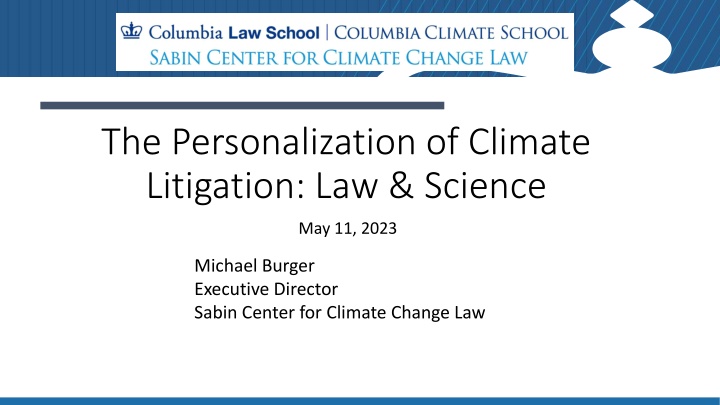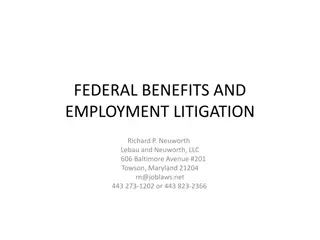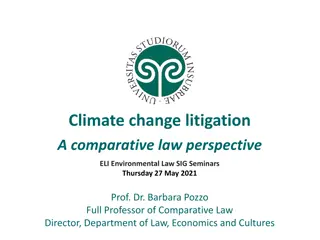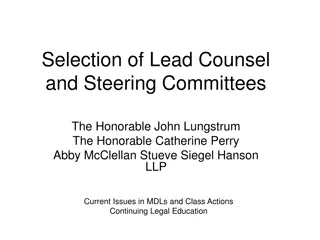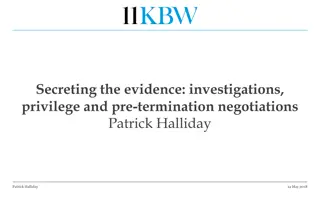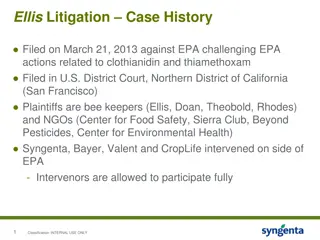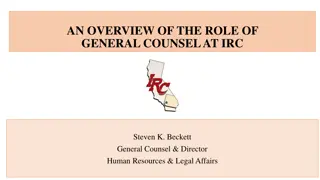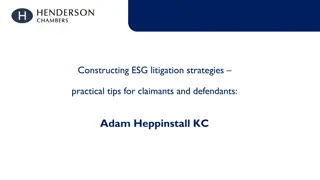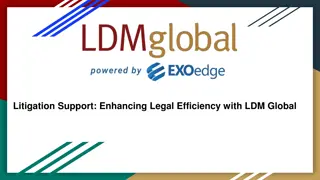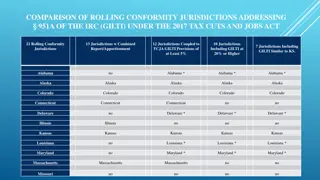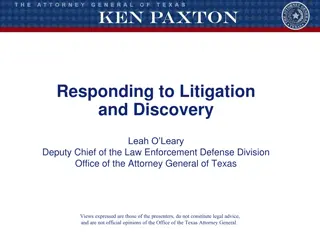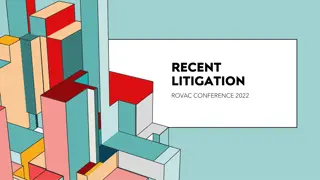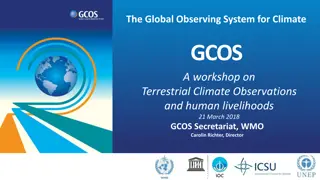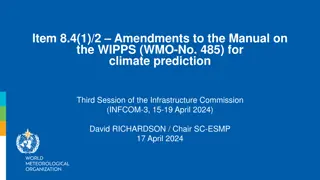Overview of Global Climate Litigation Trends and Jurisdictions Represented
The growth of climate litigation worldwide has been significant, with multiple jurisdictions engaging in legal actions related to climate change since 2017. The United States accounts for a significant portion of cases, but other countries and international bodies are also actively involved. Various legal obligations and causes of action are being pursued, including statutory, policy, constitutional, human rights, common law, and tort theories. This trend reflects the increasing recognition of climate change as a pressing global issue that requires legal interventions.
Download Presentation

Please find below an Image/Link to download the presentation.
The content on the website is provided AS IS for your information and personal use only. It may not be sold, licensed, or shared on other websites without obtaining consent from the author.If you encounter any issues during the download, it is possible that the publisher has removed the file from their server.
You are allowed to download the files provided on this website for personal or commercial use, subject to the condition that they are used lawfully. All files are the property of their respective owners.
The content on the website is provided AS IS for your information and personal use only. It may not be sold, licensed, or shared on other websites without obtaining consent from the author.
E N D
Presentation Transcript
The Personalization of Climate Litigation: Law & Science May 11, 2023 Michael Burger Executive Director Sabin Center for Climate Change Law
Climate litigation has grown steadily both within the U.S. and globally since 2017. The number of jurisdictions represented in global climate litigation has grown steadily as well. Growth of Climate Litigation
Number of cases per jurisdiction* Jurisdiction Number of cases Chile, Netherlands 7 each Italy, Pakistan 6 each Belgium, Japan, Inter-American System of Human Rights 5 each Jurisdiction Number of cases United States of America (~70 per cent) 1522 Ireland 4 Australia 127 Austria, Czech Republic, Ecuador, Guyana, Philippines, Republic of Korea, Switzerland, Stockholm Chamber of Commerce, United Nations Special Procedures (Special Rapporteurs), World Trade Organization Dispute Settlement Body 3 each United Kingdom of Great Britain and Northern Ireland 79 European Union 62 Germany 38 Canada 34 China, Denmark, Kenya, Nigeria, Norway, Sweden, T rkiye, Uganda, Ukraine, International Court of Justice, United Nations Human Rights Committee 2 each Brazil 30 New Zealand 26 France 22 Mexico 18 Estonia, Finland, Luxembourg, Nepal, Papua New Guinea, Peru, Russian Federation, Slovenia, Thailand, East African Court of Justice, European Committee on Social Rights, International Criminal Court, International Tribunal of the Law of the Sea, Permanent Court of Arbitration, United Nations Committee on Rights of the Child, United Nations Secretary General 1 each Spain 17 Indonesia 12 European Court of Human Rights (ECtHR) 12 India 11 UNFCCC 11 Argentina 10 Colombia, Poland, South Africa, ICSID 9 each Total 2180 *Numbers updated until December 31, 2022.
Issues: Sources of legal obligations Statutory or Policy Causes of Action Constitutional and Human Rights Common Law/Tort Theories Statutes & Policies Climate Rights Common Law/Torts
Government Obligations Government Obligations GHG Emissions GHG Emissions Suing governments for regulatory inaction + contributions to climate change Citizens and public interest groups are seeking court orders to accelerate GHG reductions and end policies such as fossil fuel subsidies.
Corporate Accountability Corporate Accountability Suing companies for disinformation+ contributions to climate change Liability for corporate contributions to climate change Plaintiffs seeking monetary damages to help cover adaptation costs, as well as changes in corporate conduct Some cases pursuing a public deception theory, where liability is based on climate disinformation Corporate greenwashing suits
Preparing for Climate Impacts and Risks Preparing for Climate Impacts and Risks Adaptation and disclosure related lawsuits Failure-to-disclose: Challenging government or corporate failures to analyze and disclose climate change-related considerations in planning documents, environmental impact assessments, financial disclosures, etc. Failure-to-adapt: Challenging government or corporate failures to prepare for the impacts of climate change on infrastructure, communities, or natural resources. Defense of adaptation: Defending actions taken in response to climate change against legal challenges
Detection and Attribution Research Detection and Attribution Research An essential tool in climate litigation Global Climate Change Attribution: How are human activities affecting the global climate system? (IPCC WGI) Extreme Event Attribution: How are changes in the global climate system affecting the frequency, magnitude, and other characteristics of extreme weather events? Impact Attribution: How are changes in the global climate system affecting other interconnected natural and human systems? (IPCC WGII) Source Attribution: To what extent have different sectors, activities, and entities contributed to anthropogenic climate change? Source: Michael Burger, Jessica Wentz, and Radley Horton, The Law and Science of Climate Change Attribution, 5 COLUMBIA JOURNAL OF ENVIRONMENTAL LAW 57 (2020)
Role of Attribution Research + Climate Science Role of Attribution Research + Climate Science Causation and Foreseeability 1. Causation: Establishing a causal link between the defendant s contributions to climate change and injuries to the public or individual plaintiffs. Harm to public / plaintiffs Global climate change Defendant s conduct Physical impacts 2. Foreseeability: Demonstrating that climate-related impacts are foreseeable and therefore should be considered in decision-making and planning processes.
Juliana v. United States Juliana v. United States Alleging U.S. climate + energy policy violated fundamental rights Plaintiffs supported their case with declarations by the 21 plaintiffs and reports from 18 experts, as well as hundreds of government records. Some of the experts included: James Hansen (climate, impact, and source attribution) Kevin Trenberth (extreme event attribution) Joseph Stiglitz (source attribution) Peter Erickson (source attribution) Gus Speth (government responsibility) Complete list at: http://climatecasechart.com/case/juliana-v-united-states/
Juliana v. US Juliana v. US Extreme Event Attribution: Expert Report of Dr. Kevin Trenberth Connection between climate change and extreme events such as hurricanes, floods, droughts, and wildfires Examples of specific extreme events that have been attributed to anthropogenic climate change
Juliana v. US Juliana v. US Extreme Event Attribution: Expert Report of Dr. Kevin Trenberth Effect of extreme events on youth plaintiffs Examples of injuries include: Property damage and displacement due to storms and flooding Asthma from wildfires Displacement due to water scarcity
Corporate Obligations Corporate Obligations Lliuya v. RWE AG Peruvian farmer sued the German utility RWE for its contribution to climate change, seeking compensation based on the costs of protecting his town from flood risk arising from glacier retreat. Seeking compensation for 0.47% of flood protection costs, based on RWE's cumulative contribution to global GHG emissions from industrial sources Climate scientists conducted a targeted attribution study, found that anthropogenic climate change was responsible for essentially all of the observed glacier retreat. Stuart-Smith et al., Increased outburst flood hazard from Lake Palcacocha due to human-induced glacier retreat, 14 NATURE GEOSCIENCE 85 (2021)
Responding to Climate Change Responding to Climate Change Legal Questions About Adaptation Legal Questions About Adaptation Lawsuits challenging failures to prepare for the impacts of climate change on infrastructure, communities, or natural resources. Lawsuits challenging failures to analyze and disclose climate change impacts in planning documents (e.g., environmental impact reports, management plans) Legal defense of adaptation measures Attribution research is primarily used to demonstrate that climate change impacts are foreseeable and thus the defendant had an obligation to account for those impacts.
Responding to Climate Change Responding to Climate Change Examples of Adaptation Examples of Adaptation- -Oriented Claims Oriented Claims Conservation Law Foundation v. Massachusetts DEP challenging siting of landfill on coastline vulnerable to sea level rise and other climate impacts Casa Mira Homeowners Association v. California Coastal Commission challenging local coastal plan which prohibited long-term shoreline protective devices, claiming that this would limit ability to address sea level rise Conservation Law Foundation v. Shell alleging violations of Clean Water Act (CWA) arising from failure to prepare coastal facilities for climate impacts Cole v. Collier Texas federal court recognized government obligation to protect inmates from extreme heat events, which will be exacerbated by climate change
From Source Attribution to Impact Attribution From Source Attribution to Impact Attribution New research helps flesh out the causal chain Corporate obligations: Government obligations: Richard Heede, Tracing anthropogenic carbon dioxide and methane emissions to fossil fuel and cement producers, 1854 2010, 122 CLIMATIC CHANGE241 (2014) ( Carbon Majors ) Otto et al., Assigning historic responsibility for extreme weather events, 7 NATURE CLIMATE CHANGE 757 (2017) Jason Hickel, Quantifying national responsibility for climate breakdown: an equality-based attribution approach for carbon dioxide emissions in excess of the planetary boundary, 4 Lancet Planetary Health E399 (2020) Ben Franta, Early oil industry knowledge of CO2 and global warming, 8 NATURE CLIMATE CHANGE 1024 (2018) Ekwurzel et al., The rise in global atmospheric CO2, surface temperature, and sea level from emissions traced to major carbon producers, 144 CLIMATIC CHANGE 179 (2017) Economic Impacts: Licker et al., Tracing Fossil Fuel Companies Contribution to Climate Change and Ocean Acidification (UCS 2019). Strauss et al., Economic damages from Hurricane Sandy attributable to sea level rise caused by anthropogenic climate change, 12 NATURE COMMUNICATIONS 2720 (2021) Stuart-Smith et al., Increased outburst flood hazard from Lake Palcacocha due to human-induced glacier retreat, 14 NATURE GEOSCIENCE 85 (2021) David J. Frame et al., The economic costs of Hurricane Harvey attributable to climate change, 160 CLIMATIC CHANGE 171 (2020)
Contact Information: mburger@law.columbia.edu Important Links https://climate.law.columbia.edu/ www.climatecasechart.com blogs.law.columbia.edu/climatechange/ twitter.com/SabinCenter www.facebook.com/ColumbiaClimateLaw https://www.linkedin.com/company/sabin-center-for-climate-change-law/
